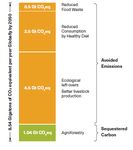Presentation by Karin Ulmer The role of land and transformative agriculture in EU policies Brussels 6/11/2018 - Fern
←
→
Page content transcription
If your browser does not render page correctly, please read the page content below
Presentation by Karin Ulmer
The role of land and transformative
agriculture in EU policies
Brussels 6/11/2018
….is a network of 14 faith-based
development agencies from across
Europe focusing on climate justice,
food security and development
policies, pursuing a rights-based
and livelihoods approach in EU
policies. It is part of a global
network of 140 relief and
development agencies committed to
justice, peace and dignity for all.
Members of CLARA include climate
justice advocates, faith-based groups,
conservation groups, land rights
campaigners, development
organizations, agroecologists, and
representatives of people’s movements.Key Findings The missing pathways to 1.5°C: The role of the land sector in
ambi>ous climate ac>on
CLARA’s analy>c approach:
• intersected crises : climate change, biodiversity loss, viola5ons of land rights
• Inseparable solu5ons: food security, human rights, restore natural ecosystems
• Equity as basis – solu5ons for all
• Problem is over consump5on of the world’s resources by those able to do so
Greater ambi>ons:
• Secure land rights, restore forest ecosystems, more sustainable food systems
• Increase area of land under secure community-based tenure systems to ensure long-term protec5on
• Focus solu5ons on holis5c approaches that tackle all crises at once.
• Rights and biodiversity are essen5al building blocks for effec5ve climate ac5on, health and livelihoods.
• A plan for low-risk, long-lived, and low-cost climate ac5on in land and forests.
Challenges:
• Mee5ng growing food demands while minimizing ecological losses
• Many agricultural and natural ecosystems are to collapse due to over exploita5on, fragmenta5on and pollu5on.
• Feedback loops: the more ecosystems are degraded the more carbon is released, the harder to mi5gate climate change
.• Agricultural pathway prac5ces include agroecology, agroforestry, reduc5on in synthe5c nitrogen fer5lizer, less and beKer livestock produc5on, healthy diets, transformed food systems (fossil-fueled hea5ng of greenhouses, food miles, frozen chain, food loss and waste, etc) • The CLARA report shows how ecosystem-based approaches in the land sector, and agroecological system changes in food produc5on and consump5on both could deliver: 11 Gt CO2eq /year in avoided emissions, almost 10 Gt CO2 /year in carbon sequestered by 2050, resul5ng in 448 Gt CO2 in cumula5ve removals to 2100.
Indigenous people and local communi5es would retain and expand areas under their management; doing so protects the equivalent of over 1000 Gt CO2 as carbon stocks - essen5al for avoided emissions.
In conclusions The missing pathways to 1.5°C:
The role of the land sector in ambi>ous climate ac>on
• Systems approach to intersected crisis of climate, land
rights, and food; no trade offs. [no magic bullets]
• Focus on biodiversity and rights delivers greater
mi5ga5on ambi5on than focusing on carbon only.
• Land rights are key to ecosystem protec5on.
• Adapta5on in agriculture delivers substan5al mi5ga5on
benefits [‘mi5gap5on’]
• Transforma5on: Food produc5on systems can be
restructured towards agroecological approaches.
• Equity and SDGs: Equitably reducing consump5on,
par5cularly of animal products, represent the single
most effec5ve climate interven5on in the land sector.
• Sharing and reconcilia5on: Climate-compa5ble food
systems increase resilience while reducing hunger and
rich-country diseases indica5ve of poor diets. [climate
jus5ce; conflict preven5on; disaster risk reduc5on]
27/10/2018, Berlin, “Dampf machen – wir haben es saK” - tax-financed loss of biodiversityRethinking scaling E-Book available at: hKp://www.digitaalproefschrif.nl/ebooks/
seerp_wigboldus
innovations PDF available at: hKps://bit.ly/2Pw8alIYou can also read


























































